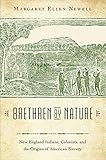Brethren by nature : New England Indians, colonists, and the origins of American slavery / Margaret Ellen Newell.
Material type: TextPublication details: Ithaca : Cornell University Press, (c)2015.Description: 1 online resourceContent type:
TextPublication details: Ithaca : Cornell University Press, (c)2015.Description: 1 online resourceContent type: - text
- computer
- online resource
- 9780801456480
- E98 .B748 2015
- COPYRIGHT NOT covered - Click this link to request copyright permission: https://lib.ciu.edu/copyright-request-form
| Item type | Current library | Collection | Call number | URL | Status | Date due | Barcode | |
|---|---|---|---|---|---|---|---|---|
 Online Book (LOGIN USING YOUR MY CIU LOGIN AND PASSWORD)
Online Book (LOGIN USING YOUR MY CIU LOGIN AND PASSWORD)
|
G. Allen Fleece Library ONLINE | Non-fiction | E98.6 (Browse shelf(Opens below)) | Link to resource | Available | ocn916715144 |
Includes bibliographies and index.
Introduction : the problem of Indian slavery in early America -- David's warre : the Pequot War and the origins of slavery in New England -- I doe not see how we can thrive until wee get into a stock of slaves : slavery in the Puritan Atlantic world -- Indians we have received into our houses : Pequot War captives in New England households -- Such a servant is part of her master's estate : acculturation, resistance, and the making of a hybrid society -- An Indian to help in the work : the importance of Indian labor in the New England economy -- We sold 47 Indians, young and old, for 80£ in money : enslavement in King Philip's War -- As good if not better then the Moorish slaves : law, slavery, and the second native diaspora -- Free men subjects to the king : the search for enslavable Indians in the Northeast and Southeast -- To be sold in any part of ye kings dominyons : judicial enslavement of New England Indians -- Epilogue : Indians and the origins of American slavery and abolitionism.
In 'Brethren by Nature', Margaret Ellen Newell reveals a little-known aspect of American history: English colonists in New England enslaved thousands of Indians. Massachusetts became the first English colony to legalize slavery in 1641, and the colonists' desire for slaves shaped the major New England Indian wars, including the Pequot War of 1637, King Philip's War of 1675-76, and the northeastern Wabanaki conflicts of 1676-1749. When the wartime conquest of Indians ceased, New Englanders turned to the courts to get control of their labor, or imported Indians from Florida and the Carolinas, or simply claimed free Indians as slaves.
COPYRIGHT NOT covered - Click this link to request copyright permission:
There are no comments on this title.
